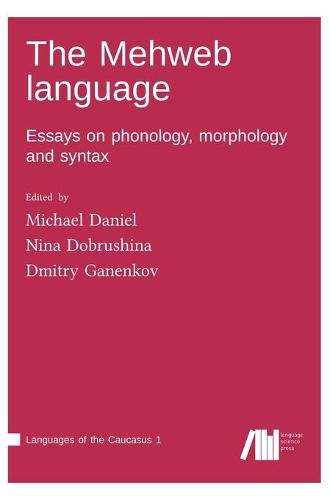Readings Newsletter
Become a Readings Member to make your shopping experience even easier.
Sign in or sign up for free!
You’re not far away from qualifying for FREE standard shipping within Australia
You’ve qualified for FREE standard shipping within Australia
The cart is loading…






This title is printed to order. This book may have been self-published. If so, we cannot guarantee the quality of the content. In the main most books will have gone through the editing process however some may not. We therefore suggest that you be aware of this before ordering this book. If in doubt check either the author or publisher’s details as we are unable to accept any returns unless they are faulty. Please contact us if you have any questions.
This book is an investigation into the grammar of Mehweb (Dargwa, East Caucasian also known as Nakh-Daghestanian) based on several years of team fieldwork. Mehweb is spoken in one village community in Daghestan, Russia, with a population of some 800 people, In many ways, Mehweb is a typical East Caucasian language: it has a rich inventory of consonants; an extensive system of spatial forms in nouns and converbs and volitional forms in verbs; pervasive gender-number agreement; and ergative alignment in case marking and in gender agreement. It is also a typical language of the Dargwa branch, with symmetrical verb inflection in the imperfective and perfective paradigm and extensive use of spatial encoding for experiencers. Although Mehweb is clearly close to the northern varieties of Dargwa, it has been long isolated from the main body of Dargwa varieties by speakers of Avar and Lak. As a result of both independent internal evolution and contact with its neighbours, Mehweb developed some deviant properties, including accusatively aligned egophoric agreement, a split in the feminine class, and the typologically rare grammatical categories of verificative and apprehensive. But most importantly, Mehweb is where our friends live.
$9.00 standard shipping within Australia
FREE standard shipping within Australia for orders over $100.00
Express & International shipping calculated at checkout
This title is printed to order. This book may have been self-published. If so, we cannot guarantee the quality of the content. In the main most books will have gone through the editing process however some may not. We therefore suggest that you be aware of this before ordering this book. If in doubt check either the author or publisher’s details as we are unable to accept any returns unless they are faulty. Please contact us if you have any questions.
This book is an investigation into the grammar of Mehweb (Dargwa, East Caucasian also known as Nakh-Daghestanian) based on several years of team fieldwork. Mehweb is spoken in one village community in Daghestan, Russia, with a population of some 800 people, In many ways, Mehweb is a typical East Caucasian language: it has a rich inventory of consonants; an extensive system of spatial forms in nouns and converbs and volitional forms in verbs; pervasive gender-number agreement; and ergative alignment in case marking and in gender agreement. It is also a typical language of the Dargwa branch, with symmetrical verb inflection in the imperfective and perfective paradigm and extensive use of spatial encoding for experiencers. Although Mehweb is clearly close to the northern varieties of Dargwa, it has been long isolated from the main body of Dargwa varieties by speakers of Avar and Lak. As a result of both independent internal evolution and contact with its neighbours, Mehweb developed some deviant properties, including accusatively aligned egophoric agreement, a split in the feminine class, and the typologically rare grammatical categories of verificative and apprehensive. But most importantly, Mehweb is where our friends live.